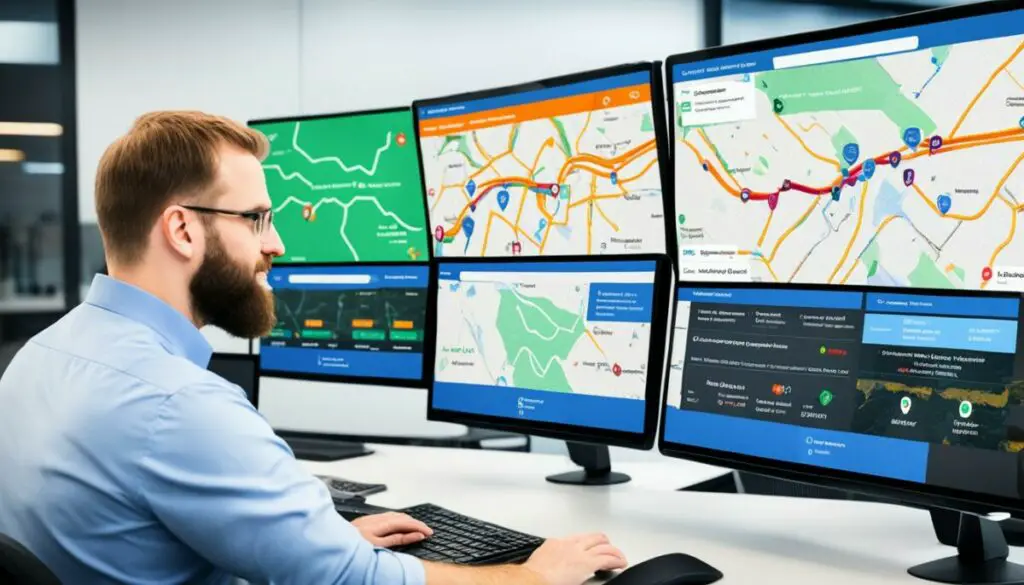Last Updated on 3 months by Francis
Are you interested in the transportation industry and looking for a rewarding career opportunity? Starting a truck dispatching business might be just what you need. With the right combination of education, experience, and business acumen, you can build a successful truck dispatcher business and provide valuable services to both truck drivers and freight brokers.
Welcome to our comprehensive dispatching business guide! In this article, we will walk you through the essential steps to start and grow your own dispatching business. From understanding the profitability of truck dispatching to choosing the right dispatcher software, we have you covered.
So, if you’re ready to take the first step towards starting your dispatching business, let’s dive in!
Contents
Key Takeaways:
- Starting a truck dispatching business can be a lucrative career choice in the transportation industry.
- Independent truck dispatchers typically earn a percentage of the revenue generated from each load they coordinate.
- To start independent dispatching, define your target market and tailor your services to their needs.
- Evaluate start-up costs and financial projections to ensure the viability of your business.
- Choose the right dispatcher software for efficient operations.
Is truck dispatching profitable?

Truck dispatching can be a lucrative career choice, offering opportunities for independent truck dispatchers to earn a significant income. While profitability may vary based on factors such as experience, location, and client base, successful truck dispatchers have the potential to generate substantial revenue through their services.
As an independent truck dispatcher, your earnings are typically based on a percentage of the revenue generated from each load you coordinate. This percentage can range from 5% to 10% or even higher, depending on various factors. The more loads you handle and the higher the revenue generated from these loads, the greater your earning potential.
With the trucking industry constantly in motion, there is a consistent demand for dispatchers to efficiently allocate freight and manage operations. By building a reputation for providing exceptional service, you can attract a growing client base and increase your profitability.
“Truck dispatching can be a profitable business if you are dedicated, organized, and able to handle the demands of a fast-paced industry. With the right skills and a solid client base, you can enjoy a successful career as an independent truck dispatcher.”
Maximizing profitability as a truck dispatcher also involves effectively managing costs. By investing in the right tools, such as transportation management software and load board subscriptions, you can streamline your operations and increase efficiency, allowing you to handle more loads and maximize your revenue.
Moreover, continuously expanding your industry knowledge and networking within the trucking community can lead to new opportunities and collaborations that can contribute to the profitability of your truck dispatching business.
Key points:
- Truck dispatching can be a lucrative career choice.
- Earnings are typically a percentage of the revenue generated from each load.
- More loads and higher revenue mean increased profitability.
- Efficient operations, cost management, and industry networking are essential for maximizing profitability.
How do I start independent dispatching?

Starting your own independent truck dispatching business is an exciting venture that can lead to a rewarding career in the transportation industry. To help you get started, here are the key steps to follow:
1. Gain the necessary truck dispatching training
To excel in independent dispatching, it is important to acquire the right skills and knowledge. Consider enrolling in a reputable truck dispatching training program where you can learn about load coordination, route planning, communication with drivers, and other essential aspects of the business. This training will ensure you have a solid foundation to build your dispatching career upon.
2. Establish a solid business structure
Setting up a proper business structure is crucial for the success of your independent dispatching venture. Choose a suitable legal entity such as a sole proprietorship, LLC, corporation, or partnership, depending on your long-term goals and preferences. Consult with a business attorney or accountant to determine the best structure for your specific situation.
3. Develop a comprehensive business plan
A well-thought-out business plan is essential to guide your independent dispatching business toward success. Outline your goals, target market, competitive analysis, pricing strategy, marketing approach, and financial projections. This plan will serve as your roadmap and help you stay focused on your objectives.
4. Invest in the right tools and technology
Equipping yourself with the appropriate tools and technology is essential for efficient dispatching operations. Consider investing in a reliable transportation management software (TMS) that offers features like real-time route planning, load tracking, and driver communication. Additionally, ensure you have a dedicated office space equipped with a computer, printer, and phone to effectively manage your business.
5. Network and build relationships
Networking plays a vital role in the trucking industry. Attend industry events, join professional associations, and connect with truck drivers, freight brokers, and other key players in the field. Building strong relationships can lead to valuable partnerships and referrals, helping you grow your independent dispatching business.
6. Market your services effectively
To attract clients and establish your presence in the industry, invest time and effort in marketing your dispatching services. Create a professional website that showcases your experience, services, and contact information. Leverage social media platforms and online directories to increase your visibility and engage with potential customers. Consider offering special promotions or discounts to incentivize new clients to work with you.
“Starting your own independent dispatching business requires dedication, hard work, and a passion for the transportation industry. By following these steps and continually learning and adapting to industry trends, you can create a successful career as an independent truck dispatcher.”
By adopting a strategic approach and equipping yourself with the right knowledge and tools, you can confidently start your own independent dispatching business and thrive in the competitive trucking industry.
Define your target market

To start a successful truck dispatching business, it’s crucial to define your target market. Researching the trucking industry will help you identify potential customers who would benefit from your truck dispatching services. By understanding your target market, you can tailor your services and sales pitch to meet the specific needs of potential clients, increasing your chances of success in the competitive trucking industry.
When defining your target market, consider the following:
- Owner-operators: These are truck drivers who own and operate their own trucks. They often need assistance with load coordination, route planning, and other administrative tasks. Targeting owner-operators can be an excellent opportunity to establish long-term relationships and build a strong client base for your dispatching business.
- Small trucking companies: Small trucking companies may require assistance in managing their fleet and loads efficiently. Offering your dispatching services to these companies can help them streamline their operations and focus on other aspects of their business.
- Local businesses dependent on freight transportation: Many local businesses rely on efficient freight transportation to deliver their goods and services. Understanding the needs of local businesses will allow you to offer tailored dispatching services that can help them meet their delivery deadlines and maintain customer satisfaction.
While defining your target market, it is also essential to research your competitors. Analyze the pricing, services, and strategies offered by other truck dispatching service providers in your area. This analysis will help you identify ways to outperform your local competition and differentiate your services in the market.
Benefits of defining your target market
“When you define your target market in the trucking industry, you can focus your efforts and resources on attracting and retaining potential customers who are most likely to benefit from your truck dispatching services. By understanding their needs and preferences, you can tailor your services and marketing messages, increasing your chances of business success.”
A clear understanding of your target market will enable you to develop effective marketing strategies, tailored services, and a competitive pricing structure that caters to the unique needs of your potential customers. By aligning your business with the demands of the trucking industry, you can position yourself as a valuable partner and trusted resource for truck drivers and freight transportation companies alike.
| Target Market | Description |
|---|---|
| Owner-operators | Truck drivers who own and operate their own trucks |
| Small trucking companies | Companies that operate a small fleet of trucks |
| Local businesses | Businesses that rely on freight transportation for their operations |
Evaluate start-up costs and financial projections
When starting a truck dispatching business, it’s crucial to carefully evaluate your start-up costs and create financial projections to ensure the financial viability and success of your venture. Understanding the expenses involved and projecting your financial outlook will help you make informed decisions and set realistic goals for your business.
Start-up costs for a truck dispatching company can include:
- Office space or home office setup
- Computer, printer, and phone
- Other office supplies
- Transportation management software (TMS) and load board subscriptions
- Marketing and advertising expenses
Creating financial projections involves considering various factors such as:
- Number of trucks you plan to dispatch
- Expected revenue per truck
- Operating costs
- Your average salary as an independent truck dispatcher
By analyzing these factors and projecting your financial performance, you can gain insight into the profitability of your business and determine the necessary growth to achieve your desired level of success.
Let’s take a closer look at these factors:
Number of Trucks
Determining the number of trucks you plan to dispatch can significantly impact your financial projections. Consider your resources and capacity, as well as the demand in your target market. Start with a conservative estimate and adjust as your business grows and evolves.
Expected Revenue Per Truck
Estimating the revenue you can generate per truck is crucial for projecting your income. Research prevailing rates in the industry and consider your ability to negotiate favorable contracts. Collaborate with drivers and negotiate commission rates that are mutually beneficial.
Operating Costs
Identify and calculate your operating expenses, including fuel costs, maintenance and repairs, insurance, permits, and other overhead expenses. Keep in mind that operating costs may vary based on factors such as the size of your fleet and the region you operate in.
Your Average Salary
As an independent truck dispatcher, you are the business owner and operator. Determine your desired salary based on market rates and your personal financial goals. Incorporate this into your financial projections to understand the overall profitability of your company.
Here’s an example table that showcases a hypothetical financial projection for a truck dispatching business:
| Year | Number of Trucks | Expected Revenue Per Truck | Operating Costs | Your Salary | Net Profit |
|---|---|---|---|---|---|
| Year 1 | 5 | $3,000 | $50,000 | $40,000 | $25,000 |
| Year 2 | 10 | $3,500 | $75,000 | $45,000 | $80,000 |
| Year 3 | 15 | $4,000 | $100,000 | $50,000 | $125,000 |
Remember, these projections are based on hypothetical data and serve as an example. Your specific financial projections will depend on various factors unique to your business.
Choose the right dispatcher software

When it comes to running a successful truck dispatching business, choosing the right dispatcher software is vital. A reliable and feature-rich software solution can streamline your operations and help you stay ahead of the competition. Here are some key factors to consider when selecting dispatcher software:
- Real-time Route Planning: Look for software that offers real-time route planning capabilities. This will allow you to efficiently assign and optimize routes for your drivers, reducing fuel costs and improving delivery times.
- Tracking and Communication: The software should provide robust tracking features that enable you to monitor the progress of your trucks in real-time. Additionally, it should facilitate seamless communication between the dispatcher and drivers, allowing for quick updates and status reports.
- Load Management: Effective load management is essential for maximizing efficiency and profitability. Ensure that the software has features for load tracking, load assignment, and load optimization, helping you effectively manage and allocate resources.
- User-Friendliness: Opt for software that has an intuitive and user-friendly interface. This will minimize the learning curve for you and your team, allowing for quicker adoption and increased productivity.
- Budget-Friendly Pricing: Consider the pricing plans of different software providers and choose a solution that aligns with your budget. Look for transparent pricing models that offer flexibility and scalability as your business grows.
- Tutorials and Customer Support: Comprehensive tutorials and reliable customer support are crucial features to have. They assist with troubleshooting and provide guidance when you encounter any issues or challenges while using the software.
By carefully evaluating these features and selecting the right dispatcher software, you can ensure efficient operations and enhance the overall performance of your truck dispatching business.
Investing in the right dispatcher software can be a game-changer for your truck dispatching business. It’s worth taking the time to research and compare different options to find the software that best meets your specific needs and requirements.
| Dispatcher Software Features | Real-time Route Planning | Tracking and Communication | Load Management | User-Friendliness | Budget-Friendly Pricing | Tutorials and Customer Support |
|---|---|---|---|---|---|---|
| Software A | ✓ | ✓ | ✓ | ✓ | ✓ | ✓ |
| Software B | ✓ | ✓ | ✓ | ✓ | ✓ | ✓ |
| Software C | ✓ | ✓ | ✓ | ✓ | ✓ | ✓ |
Market your dispatching business
Establishing an online presence is crucial for marketing your dispatching business and positioning yourself as a trusted authority in the trucking industry. A professional website, active social media presence, and engagement with the trucking community are essential elements of a successful marketing strategy.
“By leveraging the power of the internet and social media, you can reach a larger audience of potential customers and build credibility in your industry.” – John Smith, Marketing Expert
Create a Professional Website
Create a professional website where potential customers can learn more about your dispatching services, experience, and certifications. Invest in a clean and user-friendly design that conveys your professionalism and expertise. Include an “About Us” page to introduce your team and highlight your unique selling points. Publish blog posts and articles to provide valuable insights and establish yourself as a thought leader in the industry.
Utilize Social Media Platforms
Utilize popular social media platforms such as Facebook and Instagram to promote your dispatching business. Create compelling content that resonates with your target audience, such as informative posts, industry news, and success stories. Engage with followers by responding to comments, answering questions, and participating in relevant discussions. Collaborate with influencers or industry experts to broaden your reach and enhance your credibility.
Build Connections with Trucking Companies
Networking and building relationships with trucking companies is a valuable marketing strategy for your dispatching business. Attend industry events, trade shows, and conferences to connect with potential clients and partners. Join industry-related forums and chat boards to engage with the trucking community and establish yourself as a knowledgeable resource. Collaborate with trucking companies on projects or initiatives to demonstrate your expertise and build trust.
Register on Industry-Related Forums and Chat Boards
Register on industry-related forums and chat boards to connect with potential clients and market your dispatching services effectively. Participate in discussions, answer questions, and provide valuable insights to establish your expertise. Share success stories and case studies of how your dispatching services have helped other trucking companies improve efficiency and profitability.
Market your dispatching business with a strong online presence, engaging social media content, and active networking efforts. By effectively marketing your business, you can attract new clients, build lasting relationships, and position yourself as a trusted partner in the trucking industry.
| Benefits of Online Presence for Dispatching Business | Benefits of Social Media Marketing | Benefits of Networking with Trucking Companies |
|---|---|---|
| 1. Establish credibility and trust with potential clients | 1. Reach a wider audience of potential customers | 1. Build relationships with potential clients and partners |
| 2. Showcase your services, experience, and certifications | 2. Engage with followers and build a community | 2. Collaborate on projects or initiatives |
| 3. Provide valuable insights and thought leadership | 3. Increase brand visibility and awareness | 3. Learn from industry experts and stay updated on industry trends |
Understand your responsibilities as a truck dispatcher
As a truck dispatcher, you play a crucial role in managing freight on behalf of carriers. Your responsibilities extend to various tasks that ensure the smooth coordination of shipments. By understanding and fulfilling these responsibilities, you can effectively contribute to the efficient operation of the transportation industry.
Managing Freight
One of your primary responsibilities as a truck dispatcher is managing freight. This involves coordinating the movement of goods from one location to another, ensuring timely pickups and deliveries.
“As a truck dispatcher, you act as the intermediary between the carrier and the shipper. You have the important task of optimizing routes and ensuring that the right goods are matched with the right carriers.”
Billing and Paperwork
Another key responsibility is handling billing and paperwork. This includes generating invoices, tracking payments, and maintaining accurate records of transactions. Efficient and accurate billing and paperwork processes are essential for financial management and legal compliance.
Providing Necessary Information
As a truck dispatcher, you must provide drivers with all the necessary information related to their assignments. This includes details about the load, the pickup and delivery locations, and any special instructions or requirements they need to be aware of. Clear and comprehensive communication is key to ensuring successful and on-time deliveries.
Assigning Vehicles or Workers
You are responsible for assigning vehicles or workers to specific loads based on various factors such as load size, availability, and driver expertise. Considerations like fuel efficiency, legal weight restrictions, and driver qualifications must be taken into account when making these assignments.
Additional Services
Part of your role as a truck dispatcher may involve providing additional services to support carriers. This can include creditworthiness checks to ensure payment reliability, rate negotiation to secure favorable terms, and effectively resolving any issues or conflicts that may arise during the transportation process.
To successfully fulfill your responsibilities as a truck dispatcher, it is essential to equip yourself with the necessary tools and resources. This includes having a reliable computer, printer, and phone to communicate with drivers and other stakeholders. Embrace technology solutions that streamline processes and enhance efficiency, enabling you to better serve your clients and contribute to the success of the trucking industry.
Key Takeaways:
- As a truck dispatcher, you manage freight on behalf of carriers, coordinating timely pickups and deliveries.
- Your responsibilities include handling billing, paperwork, and providing necessary information to drivers.
- You must assign vehicles or workers to specific loads and may offer additional services such as creditworthiness checks and rate negotiation.
- Equipping yourself with the necessary tools and resources ensures efficient fulfillment of your responsibilities.
Comply with legal requirements
When starting a truck dispatching business, it is crucial to comply with legal requirements to ensure a smooth and legally sound operation. By following these steps, you can ensure that your dispatching business meets all necessary legal obligations:
Obtain a Truck Dispatcher License
One of the first legal requirements you need to fulfill is obtaining a truck dispatcher license. The specific requirements for obtaining a license may vary by state, but most commonly, you will need at least a high school diploma or equivalent. Check with your local Department of Transportation or Motor Carrier Agency for specific licensing requirements in your area.
Apply for an Employer Identification Number (EIN)
As a business entity, it is essential to have an Employer Identification Number (EIN) for tax and legal purposes. You can apply for an EIN through the Internal Revenue Service (IRS) website or by mail using Form SS-4. Having an EIN will help you establish your business identity and facilitate your tax reporting obligations.
Choose a Business Structure
When starting a truck dispatching business, you must choose a suitable business structure. Common options include a sole proprietorship, limited liability company (LLC), corporation, or partnership. Each structure has its own legal and tax implications, so consult with a legal professional or accountant to determine the best structure for your specific needs.
Familiarize Yourself with Working Hour Regulations
As a truck dispatcher, it is important to understand the working hour regulations imposed on truck drivers. Familiarize yourself with the maximum driving hours per day, rest periods, and other relevant regulations to ensure compliance. By adhering to these regulations, you can help promote driver safety and avoid any legal issues.
Adhere to International Border Laws
If your dispatching business involves coordinating loads across international borders, it is crucial to familiarize yourself with international border laws and regulations. Compliance with these laws is necessary to ensure smooth operations and avoid any legal complications. Consult with immigration and customs authorities to understand the specific requirements for dispatching across borders.
By complying with all necessary legal requirements, you can establish a solid foundation for your truck dispatching business and operate with confidence and peace of mind.
Conclusion
Starting a truck dispatching business requires careful planning and consideration of various factors. With the steps outlined in this guide, you can begin your journey towards a successful dispatching business in the transportation industry.
First, obtain the necessary training and licenses to gain the knowledge and credentials needed to excel in this field. Understand the ins and outs of truck dispatching, as well as the legal requirements and regulations.
Next, define your target market and develop a marketing strategy to reach potential clients effectively. Create an online presence through a professional website and engage with the trucking community on social media platforms.
Lastly, remember to stay updated on industry regulations and best practices. Compliance and providing valuable services to your clients are vital to your success. Good luck with your truck dispatching business!
FAQ
Is starting a truck dispatching business profitable?
Yes, starting a truck dispatching business can be profitable. Independent truck dispatchers typically earn a percentage of the revenue generated from each load they coordinate, ranging from 5% to 10% or higher.
How do I start my own independent truck dispatching business?
To start your own independent truck dispatching business, you need to define your target market, evaluate start-up costs and financial projections, choose the right dispatcher software, establish an online presence, understand your responsibilities as a truck dispatcher, and comply with legal requirements.
How do I define my target market in the trucking industry?
To define your target market in the trucking industry, research and identify potential customers such as owner-operators, small trucking companies, and local businesses that rely on freight transportation. Tailor your services and sales pitch to their specific needs.
What are the start-up costs for a truck dispatching business?
The start-up costs for a truck dispatching business typically include office setup, computer equipment, transportation management software (TMS) subscriptions, marketing expenses, and more. It’s important to evaluate these costs and create financial projections to ensure profitability.
How do I choose the right dispatcher software for my business?
When selecting dispatcher software for your truck dispatching business, look for features such as real-time route planning, load management, and communication with drivers. Consider the software’s user-friendliness, pricing plans, and customer support.
How can I market my truck dispatching business?
To effectively market your truck dispatching business, create a professional website, utilize social media platforms, engage with the trucking community, and build connections with trucking companies and industry-related forums and chat boards.
What are the responsibilities of a truck dispatcher?
As a truck dispatcher, your responsibilities include managing freight on behalf of carriers, providing drivers with necessary information, assigning vehicles or workers, locating loads, handling billing and paperwork, and providing additional services like creditworthiness checks and rate negotiation.
What legal requirements should I comply with when starting a truck dispatching business?
When starting a truck dispatching business, you should obtain a truck dispatcher license, apply for an Employer Identification Number (EIN), choose a business structure, and familiarize yourself with working hour regulations for truck drivers, as well as international border laws if dispatching across borders.
Can you summarize the steps to start a truck dispatching business?
The steps to start a truck dispatching business include defining your target market, evaluating start-up costs and financial projections, choosing the right dispatcher software, establishing an online presence, understanding your responsibilities as a truck dispatcher, and complying with legal requirements.









